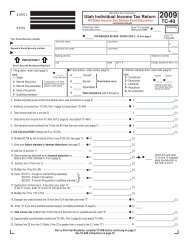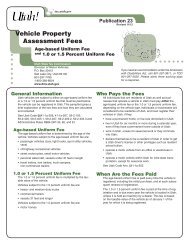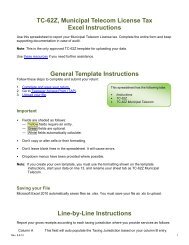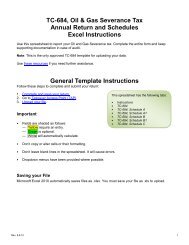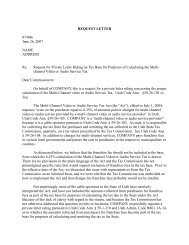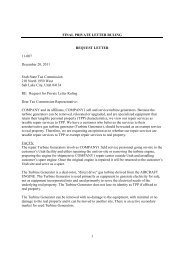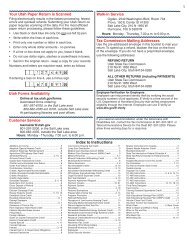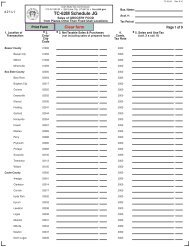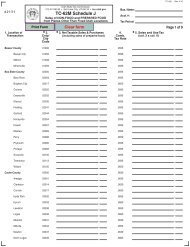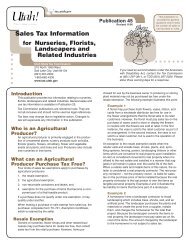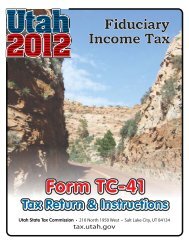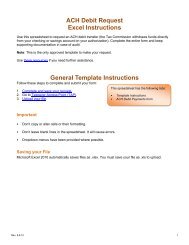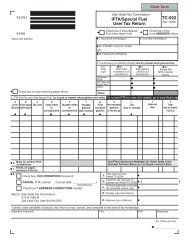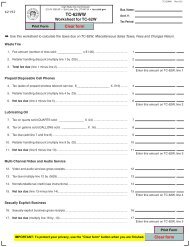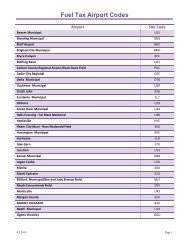Pub 25, Utah Sales and Use Tax General Information
Pub 25, Utah Sales and Use Tax General Information
Pub 25, Utah Sales and Use Tax General Information
Create successful ePaper yourself
Turn your PDF publications into a flip-book with our unique Google optimized e-Paper software.
<strong>25</strong><br />
Other <strong>Information</strong><br />
The following miscellaneous taxes <strong>and</strong> fees may also apply<br />
to certain sellers. Contact the <strong>Tax</strong> Commission for more<br />
information.<br />
Motor fuel, aviation fuel, <strong>and</strong> special fuel taxes<br />
Lubricating oil fee<br />
Beer, cigarette <strong>and</strong> tobacco products taxes<br />
Royalty payment on unprocessed brine shrimp eggs<br />
Multi-channel audio <strong>and</strong> video tax<br />
Sexually explicit business <strong>and</strong> escort service tax<br />
<strong>Sales</strong> <strong>and</strong> <strong>Use</strong> <strong>Tax</strong> Exemptions<br />
<strong>Utah</strong> law provides some exemptions from sales <strong>and</strong> use tax.<br />
See <strong>Utah</strong> Code §59-12-104 for more information.<br />
Exemption Certificates<br />
When an exemption certifi cate is required, the buyer must<br />
provide the seller with the exemption information in one of<br />
two ways:<br />
1. On a paper exemption certifi cate: form TC-721,<br />
Exemption Certifi cate; or form TC-721G, Exemption<br />
Certifi cate for Governments & Schools.<br />
A buyer needs to provide a signature when using a paper<br />
certifi cate.<br />
2. Electronically<br />
If the exemption information is provided electronically, all the<br />
information required on the paper form must be included.<br />
A seller can accept exemption certifi cates at face value. A<br />
seller is not liable for improper exemptions unless the seller<br />
takes part in claiming a fraudulent exemption.<br />
Sellers must keep exemption certifi cates in their records as<br />
documentation. A seller may use a certifi cate on fi le for its<br />
customers’ future purchases. A buyer must notify the seller if<br />
a certifi cate on fi le is cancelled, modifi ed or limited.<br />
Types of Exemptions<br />
There are three types of sales tax exemptions, based on:<br />
1. Entity (exemption certifi cate required for sales to an<br />
exempt entity)<br />
2. <strong>Use</strong> (exemption certifi cate required)<br />
3. Product (exemption certifi cate not required)<br />
Entity-Based Exemptions<br />
An entity-based exemption is determined by who buys or<br />
sells the product.<br />
Some common exemptions are:<br />
<strong>Sales</strong> to a public transit district or a subcontractor of a public<br />
transit district, if the tangible personal property is clearly<br />
identifi ed <strong>and</strong> installed or converted to real property owned<br />
by the public transit district.<br />
<strong>Sales</strong> to United States government agencies.<br />
<strong>Sales</strong> to <strong>Utah</strong> government agencies (see <strong>Pub</strong>lication 56 for<br />
lodging-related sales).<br />
<strong>Sales</strong> of construction materials to most <strong>Utah</strong> government<br />
agencies — only if installed by the agencies’ employees.<br />
Construction materials bought by or for public elementary<br />
<strong>and</strong> secondary schools are exempt from sales tax. The<br />
construction materials must be clearly identifi ed <strong>and</strong> segregated,<br />
<strong>and</strong> they must be installed or converted to real<br />
property owned by the school. See Rule R865-19S-23.<br />
To qualify for this exemption, the purchase must be made<br />
with the government agency’s funds. A purchase does not<br />
qualify for this exemption if a government employee makes<br />
the purchase with personal funds, even if the government<br />
agency reimburses the employee.<br />
<strong>Sales</strong> to U.S. government employees traveling on offi cial<br />
business, if they present one of the following:<br />
a complete <strong>and</strong> signed form TC-721G, Exemption Certifi<br />
cate for Governments, Foreign Diplomats & Schools;<br />
a check from the government agency;<br />
a purchase order; or<br />
a voucher.<br />
Sellers must keep proof that the purchase qualifi es for<br />
the exemption, such as a copy of the government check,<br />
purchase order, voucher or signed form TC-721G.<br />
<strong>Sales</strong> made to or by:<br />
a local agency on aging;<br />
a senior citizen center owned by a county, city or town;<br />
<strong>and</strong><br />
a senior citizen center that contracts with a local<br />
agency on aging.<br />
Purchases by certain enrolled members of Native American<br />
tribes (including the tribe itself), if:<br />
the member has a tribal card showing a Federal Bureau<br />
Number;<br />
the purchased item is delivered to the enrolled tribal<br />
member’s own reservation (in the case of the Ute<br />
Indian Tribe, the item must be purchased on or delivered<br />
to tribal trust l<strong>and</strong>s within the Uintah <strong>and</strong> Ouray<br />
reservations); <strong>and</strong><br />
in the case of sales to the tribe itself, the buyer must<br />
present a purchase order, exemption certifi cate, or<br />
similar evidence of tribal identity.<br />
<strong>Sales</strong> made off the reservation to enrolled members of<br />
the tribe are taxable. They are exempt from tax only if the<br />
seller (or a licensed common carrier) delivers the purchased<br />
item(s) to the reservation.<br />
<strong>Sales</strong> to foreign diplomats. The U.S. State Department<br />
grants a tax exemption to eligible foreign offi cials assigned<br />
to the United States. <strong>Tax</strong> exempt foreign offi cials <strong>and</strong><br />
government offi ces are issued a <strong>Tax</strong> Exemption Card, valid<br />
nationwide. The card lists the person’s name, photograph,<br />
mission employed by, expiration date <strong>and</strong> identifi cation<br />
number.<br />
The exemption cards are used at point-of-sale for exemption<br />
from state <strong>and</strong> local sales, restaurant <strong>and</strong> lodging/<br />
occupancy taxes. These cards DO NOT exempt taxes on<br />
utilities, gasoline or vehicle purchases. The type of exemption<br />
is shown by a blue or yellow stripe on the bottom of<br />
the card. The items exempted are listed on the back of the<br />
card.<br />
Sellers must keep a copy of the card or a valid exemption<br />
certifi cate as proof of the exempt sale.<br />
page 8



